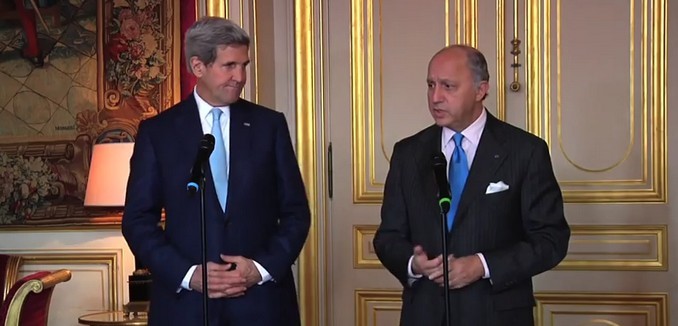U.S. Secretary of State John Kerry returned to Switzerland early Thursday to begin a renewed round of talks with Iranian Foreign Minister Javad Zarif as the two make a push for an outline agreement in advance of an agreed-upon March 31 deadline. This, after a day that saw Saudi and other forces launch an assault on Iran-backed Houthis in Yemen as the U.S.-allied president Abed Rabbo Mansour Hadi fled the country. Meanwhile, U.S. forces launched air strikes in Tikrit in Iraq–apparently as air support for Iran-backed forces trying to take the city back from the Islamic State.
Reports on Wednesday continued to discuss the reverberations of a Wall Street Journal article from last Friday about increasing tension between Paris and Washington, stemming from French concerns that Americans were giving away too much too fast in the context of a deal expected to be wrapped up in the coming days regarding Iran’s nuclear program. Reuters reported on Saturday that France was taking a tougher stance in the talks than any other Western country and that Foreign Minister Laurent Fabius had urged the French negotiating team not to make any more concessions to the Iranians.
Paris has expressed consternation over potential concessions to Iran in the nuclear talks, including the lifting of sanctions promulgated by the United Nations Security Council and Iran’s ability to continue research and development in the nuclear sphere. While the United States is pursuing a policy of phased sanctions relief in return for Iranian compliance with any signed deal, France prefers only a “symbolic easing,” according to The Guardian. French officials are reportedly pushing for a deal lasting 15 years, whereas the United States is leaning closer to one with a duration of 10 years.
France’s ambassador to the U.S., Gérard Araud, warned of the danger of having the negotiations adhere to an “artificial” deadline: “Making the end of March an absolute deadline is counterproductive and dangerous. Need all our time to finalize a complex agreement,” he wrote on Twitter last Friday.
Before the signing of the interim Joint Plan of Action (JPOA) in November 2013, Foreign Minister Fabius similarly took a hard stance against Iran, declaring that France could not accept a “sucker’s deal.” He insisted on tougher restrictions on Iran’s nuclear program, including its uranium enrichment and construction of a heavy-water reactor at Arak.
[Photo: Ministère des Affaires étrangères et du Développement international / YouTube ]




